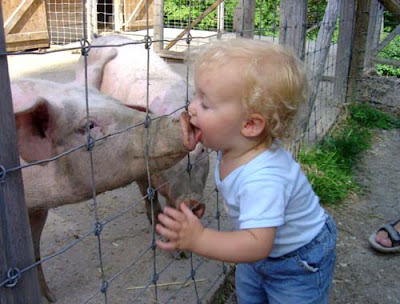Não há "gripe suína". A gripe é outra.

Há, sim, um surto de infecção por vírus influenza, de origem humana e transmitida entre humanos. Nem se sabe se é possível atingir animais, muito menos suínos. A nova gripe está sendo recomendada a se chamar de "influenza norteamericana". Essa informação foi passada pelo Prof. Dr. Vitor Picão Gonçalves, veterinário epidemiologista, professor da UnB, baseada no comunicado World Organisation for Animal Health (OIE), hoje. Apesar do texto um pouco longo para um blogue e do assunto não ser diretamente relacionado à etologia, nos sentimos no dever de informar e esclarecer. Veja infra:
"OIE position on safety of international trade of pigs and products of pig origin
Paris, April 28 - 2009 Because the current A/H1N1 related human health event has been described as swine influenza, the World Organisation for Animal Health (OIE) wishes to further clarify the facts from the animal health perspective, particularly in relation to international trade of pigs and of products of pig origin . The OIE also points out that it will continue to respond to new, incoming information as the situation evolves.
Information available to the OIE does not indicate, at this time, that the influenza outbreak currently occurring in the United States and Mexico was preceded by an outbreak of swine influenza.
Within a few days, scientific investigations that are currently under way should indicate if the virus circulating in humans is capable of infecting animal species, such as pigs, chickens and horses.
It is not correct to call the current disease ‘swine influenza'. The virus that is circulating includes genetic components of human, avian and swine origin. The OIE proposed to refer to this new virus as ‘North American influenza', using the same approach to nomenclature as used with the Asian influenza and Spanish influenza outbreaks that have occurred in the past.
Given there is no case of infection in animals confirmed in the zones where cases of human infection have been detected, it is not necessary to introduce specific measures for international trade in swine or their products nor to consider that consumers of pork products are at risk of infection.
The following update, sent to the National Delegates of the OIE's 174 Member Countries and Territories, summarises the OIE position regarding the safety of international trade in the context of the current influenza situation.
Note sent today to the OIE national Delegates from the Director General
I am writing to inform you about the current situation with A/H1N1 influenza-like human illness in Mexico and the USA . The OIE is of the view that as this virus has not, for the moment, been isolated in pigs or other animals, it is not appropriate to call it ‘swine influenza'. The OIE recommends that the virus be referred to as ‘North American influenza', in keeping with the naming of other outbreaks of influenza in the human population. Nonetheless, this emerging disease is genetically linked, amongst others, with H1N1 swine influenza and the OIE is calling for scientific research to be started with urgency to assist in clarifying the sources and the risks presented by this virus to veterinary public health and to the different animal species (pigs, poultry and horses).
Notwithstanding that this human disease is not simply swine influenza, you would be aware that swine influenza is not an OIE listed disease and there is currently no justification in the OIE Terrestrial Animal Health Standards Code for the imposition of trade measures on the importation of pigs or their products. To date there is no evidence that the virus is transmitted by food and influenza A viruses are generally not heat resistant.
In the event that the virus associated with the current human disease is shown to be circulating in animals in zones of countries that have reported human cases of infection, this should be reported to the OIE as an emerging disease. If appropriate, the OIE will develop official recommendations to prevent and control any identified risks to public health and animal health from livestock production and trade.
Please note that an importing country has the right at any time to contact an exporting country and to conduct an inspection or audit of the situation as relevant to the importation of animals or animal products (Section 5. Trade measures, import/export procedures and veterinary certification).
Please see, for information, my public statement on this issue, which may be viewed at: http://www.oie.int/eng/press/en_090427.htm .
Bernard Vallat
April 2009


Comentários